The Friendly Fire Room Presents
Listen And See
Thank you Wanda Barlow for this great idea!
Epistles Part 9
Jude 17-19
Epistles
E 09 Jude 17-19
January 29, 2017
Part 9
NKJ Jude 1:17-19
17 But you, beloved, remember the words which were
spoken before by the apostles of our Lord Jesus Christ:
18 how they told you that there would be mockers
in the last time who would walk according to their own
ungodly lusts.
19 These are sensual persons, who cause
divisions, not having the Spirit.
While it does not appear so on the surface of these verses (including 20-23), they are about a war of “words and wills;” the building up power of the Words of God over against the tearing down power of the soulish words of mockers of the Last Days who set themselves in opposition to the cause of Christ.
NKJ Jude 1:17
But you, beloved, remember the words which were spoken
before by the apostles of our Lord Jesus Christ:
remember ![]() mimnaisko, aorist imperative passive
mimnaisko, aorist imperative passive
The imperative mood, the mood of the command, always presupposes ‘one will’ speaking the ‘will of another,’ and the idea of compliance is a real expectation.
It is rather ironic, with regard to the relationship of the (4) imperative mood to reality, as compared to other grammatical moods.
First, understand that the mood of a verbal idea is used to define its relation to reality; that which has, will, or does now exist.
For example, a statement in the indicative mood is a simple statement of fact; that is, reality as perceived by the speaker.
The (2) subjunctive is the mood of probability; it is one step away from that which is actual; it leans in the direction of that which is only probable.
Sentences which express things that “should be” or that “one ought to do” are in the subjunctive mood.
Conditional sentences also make much use of the subjunctive, where the “if” makes it the mood of mild contingency.
The (3) optative is the mood of strong contingency; the mood of possibility.
Since it merely presents the action as conceivable, it is farther removed from reality than the subjunctive, the probable, the mood of “the wish.”
Example: It could happen, I wish that it would.
The farther the ideas get from reality, the greater the participation we see from the “will” involved in expectancy.
The (4) imperative is the mood of intent, and is the furthest removed from reality, even beyond that of the declaration of a wish (optative); yet once stated, the imperative carries with it the greatest expectation of the “will” that this idea should become reality through obedience to it.
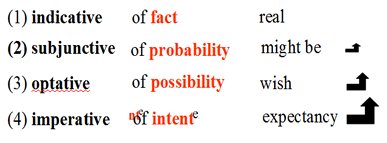
This is how God speaks His will into reality; He expects creation to obey his commands.
NKJ Jude 1:17
But you, beloved, remember the words which were spoken
before by the apostles of our Lord Jesus Christ:

This expression, to remember, is essentially a command to actively be passive; that is, to actively receive the action from an entity taking appropriate positive action upon you; in this instance, through the trusting and yielding to God to transform your mind.
Furthermore, the grammar indicates another aspect of the author’s intent; that it is expected (imperative mood) that this action should be undertaken at once (aorist-imperative).
Implication- Jude expects his believer audience to actively (consciously) receive by vividly recalling this Word of God to mind, and allowing its work to be done by the power of the Holy Spirit working in them to accomplish the just purposes of God.
Essentially, Jude is saying, I expect you beloved believers to submit yourselves, not just intellectually to the Words of the Apostles; but in spirit, to receive the force of the Truth of God the Holy Spirit in this matter.
This is not an unusual expectation from the Lord.
Most of what we commonly refer to as “doing God’s Will” is actually obediently “receiving” His words on significant matters in faith, believing that God’s Spirit is capable to work out His truth in us, in order that we might accomplish it.
“…remember the words which were spoken before by the apostles of our Lord Jesus Christ:”
![]() [perf passive of
[perf passive of ![]() ]
]
of the words (receive the things said), namely, of the words which presently stand (perf.) of that which had previously been given, and spoken, and is presently documented

![]()
unto the Apostles of the (source-active) Lord Christ Jesus
The significance of this expression is that it makes crystal clear the notion that, the ultimate active-voice command of these words is from the Lord Himself, and that the force of the command and expectation of obedience thereunto is from the Lord Himself; and it reaches us by means of the Apostles delegated authority, but our obligation is not directly to the Apostles, nor to Jude, but to the Lord.
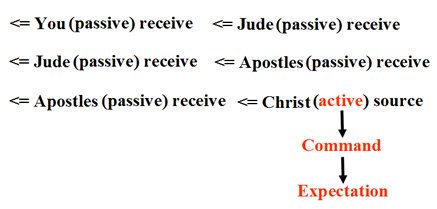
Now for the content of the words:
Comprehensive:
18 ‘They continued saying to you, “As a matter of fact (so, do not be taken by surprise), there will be existing ‘upon the last-time’ (sing.) those who will represent an interchange of effort between themselves as active agents (implied, in tacit agreement with one another to come against Christ), mockers acting in their own self-interest who take actions leading to a misdirected pathway away from God, corresponding to the results of their pursuit of godless lusts.”
there will be existing ‘upon the last-time’ (sing.)

mockers ![]() empaiktais
empaiktais
from verb-form ![]()
literally: ![]() I engage in +
I engage in + ![]() childish behavior from
childish behavior from ![]() child, servant.
child, servant.
Mockers are individuals who engage in childish behavior. Children behave the way they do in large part because of what they lack internally at the time; namely, complete development. Their “immaturity” is often demonstrated by general self-centeredness, and occasionally by attempts of aggression in the form of mocking, and making fun of those they oppose. They work with what resources they have.
In a similar fashion, the unbeliever is characterized by what they lack internally at the time; namely, the abiding presence of the Holy Spirit of God.
They work with what resources they have.
This idea is more explicitly expressed in Jude’s description in verse 19.
Note: While the mockers (false teachers) might appear to be conspiring together, their unity is incidental to their lusty sins.
They are each similarly driven internally by the desires of the natural-man; this is characteristically what they hold in common.
Comprehensive:
19 “These individuals are ones who are presently tearing
apart (the church), soulish ones, ones who presently are
not (![]() . ) having the Spirit of God.”
. ) having the Spirit of God.”
tearing apart (the church) ![]() apodiowridzo
to make a boundary between someone and to separate
from this one
apodiowridzo
to make a boundary between someone and to separate
from this one
Literally: ![]() away from +
away from + ![]() through +
through +![]() to declare
to declare ![]() is related to the idea of seeing the horizon;
or we might say the idea that declaration is a largely
horizontally oriented sweep involving words of powerful
effect, to broadcast.
is related to the idea of seeing the horizon;
or we might say the idea that declaration is a largely
horizontally oriented sweep involving words of powerful
effect, to broadcast.
The ungodly words of the false teachers are having a very destructive result in the communal (body) life of this church.
![]()
“to use soulish speech to plunge through and to separate”
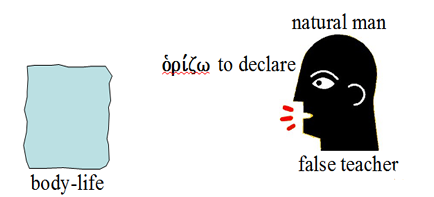
The ungodly words of the false teachers are having a very destructive result in the communal (body) life of this church.
![]()
“to use soulish speech to plunge through and to separate”
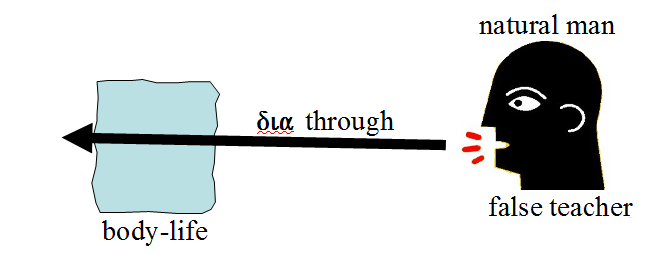
The ungodly words of the false teachers are having a very destructive result in the communal (body) life of this church.
![]()
“to use soulish speech to plunge through and to separate”
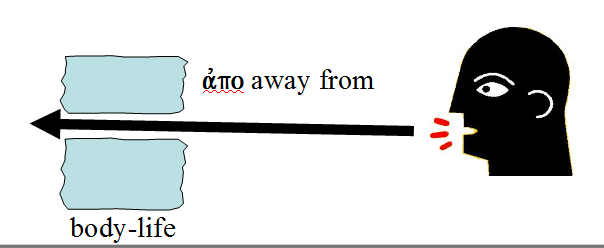
The ungodly words of the false teachers are having a very destructive result in the communal (body) life of this church.
There is absolutely no truth to the idea of the latter part of this well-known saying:
“Sticks and stones may break my bones, but words can never hurt me.”
Ungodly words can tear down and separate individuals.
The body-life in Christ is unifying and constructive on the basis of having the Holy Spirit and the gift of true life quickening in-common, drawing together and building up upon one another into unity and maturity by the transforming power of the Word of God.
tearing apart not = building together
![]() is the exact opposite of the word we will
encounter in verse 20,
is the exact opposite of the word we will
encounter in verse 20, ![]() to build on or upon;
to build up.
to build on or upon;
to build up.

with the characteristics of the noun-stem ![]() , soul;
therefore, “that which pertains to the soul,” with the
characteristics of the soul, “soulish,” and is antithetical to
the word ?, “pertaining to the spirit,” with the characteristics
of the spirit, “spiritual,” from
, soul;
therefore, “that which pertains to the soul,” with the
characteristics of the soul, “soulish,” and is antithetical to
the word ?, “pertaining to the spirit,” with the characteristics
of the spirit, “spiritual,” from ![]() spirit.
spirit.
![]() , psychikoi over against
, psychikoi over against ![]() , pneumatikoi
, pneumatikoi
We must constantly be aware of the fact that, at the moment, the spirit of the unbeliever is “dead,” and that they are, at the moment, not capable of perceiving matters of the Spirit of God. This leads us to the next interesting expression from Jude that bears witness to this specific Truth.
They are presently without (![]() ) the Spirit [explain]
) the Spirit [explain]
There are two negative particles in the Greek language:
![]() is used for summary negation, it is the clear-cut,
point-blank, objective, final “no” or “not.”
is used for summary negation, it is the clear-cut,
point-blank, objective, final “no” or “not.”
In terms of a door analogy on a matter, the door is abruptly closed and locked; this state is not subject to appeal to change.
![]() Is the weaker, milder negative, used when one does
not wish to be too positive; leaving the question open
for further remarks or appeal.
Is the weaker, milder negative, used when one does
not wish to be too positive; leaving the question open
for further remarks or appeal.
In terms of a door analogy on a matter, while the door is presently closed, it is not locked; this state is subject to appeal to change.
![]()
![]() When used together, these two particles produce
a most solemn and emphatic declaration; “Most certainly not!”
When used together, these two particles produce
a most solemn and emphatic declaration; “Most certainly not!”
This word ![]() , from the Lord should temper our attitude
when interacting with the unbeliever, always being
sensitive, but not naïve, while looking for any possible
indication of the Holy Spirit at work in some way in that
person’s life, ready to share the Gospel.
, from the Lord should temper our attitude
when interacting with the unbeliever, always being
sensitive, but not naïve, while looking for any possible
indication of the Holy Spirit at work in some way in that
person’s life, ready to share the Gospel.
Many will be surprised on the Day of Judgment when they discover that it was just as the Word of God says; only the righteousness of Christ is able to save you.All men are sinners and no one can save himself. God is just, so He must punish sin; but He is also merciful, moreover gracious, and offers His Son as the perfect sacrifice in order to purchase a place for you in heaven, which He offers to you as the free gift of eternal life.
Jesus is God Incarnate
In order to pay the debt of our sins, He came from Heaven, having been sent by the Father, where He lived a life of perfect obedience to the Father even unto the shameful death upon the cross in order to pay the debt of your sins.This gift must be received by faith, believing that Jesus’ perfect life and Cross Work was His complete and necessary Atonement for your sins, in your behalf.Faith is a gift that comes by the Power of God the Holy Spirit working in a person’s innermost being. The Holy Spirit has the authority and power to quicken your dead spirit, to make it come to life. If you have not done so before this moment, ask Jesus to forgive you your sins, tell Him you’ve stop trying to be your own savior, and ask Him to come into your life right now, and to give you eternal life. Then, in faith believing, thank Him for the gift that He is giving you, the one He paid for in full in your place, in Jesus’ name,AMEN
Copyright January, 2017
Rev. Jim Craig
All Rights Reserved